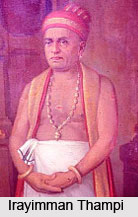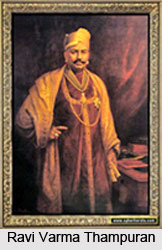 Ravi Varman Thampi, popularly known as Irayimman Thampi, was born in the year 1782. He was a Carnatic musician from the Indian state of Kerala. He was a renowned vocalist in the court of Swathi Thirunal. One of his popular composition include lullaby Omanathinkal Kidavo.
Ravi Varman Thampi, popularly known as Irayimman Thampi, was born in the year 1782. He was a Carnatic musician from the Indian state of Kerala. He was a renowned vocalist in the court of Swathi Thirunal. One of his popular composition include lullaby Omanathinkal Kidavo.
Life of Ravi Varman Thampi
Ravi Varma Thampuran, born in the year 1783, to Kerala Varma Thampuran of the Royal family of Travancore and Parvathi Pillai Thankachi of the Puthumana Ammaveedu Thampi family, daughter of Prince Makayiram Thirunal Ravi Varma and niece of the Maharajah Dharma Raja of Travancore (Prince Makayiram Thirunal was the younger brother of Dharma Raja).
He was also named after his grandfather and was called Ravi Varman Thampi which became popular as Irayimman Thampi. Thampi was brought up at a house called Kizhake Madhom by his parents. He received his early education from his father and later when under the guidance of Shankaran Elayathu in grammar, linguistics and Sanskrit literature. He wrote his first poem when he was at the age of fourteen and also dedicated it to Karthika Thirunal Dharmaraja of Travancore. Since then he occupied an enviable position in the Travancore court.
Personal Life of Ravi Varma Thampuran
 Irayimman Thampi got married to Kalli Pillai Thankachi, the daughter of his maternal uncle Puthumana Krishnan Thampi, and together they had seven children including a daughter who continued her father`s artistic and poetic legacy, Lakshmi Kutty Pillai Thankachi, also known as Kutty Kunju Thankachi (1820 - 1914).
Irayimman Thampi got married to Kalli Pillai Thankachi, the daughter of his maternal uncle Puthumana Krishnan Thampi, and together they had seven children including a daughter who continued her father`s artistic and poetic legacy, Lakshmi Kutty Pillai Thankachi, also known as Kutty Kunju Thankachi (1820 - 1914).
She also grew into a well-known poetess and received many prestigious rewards from her cousin and king Swathi Thirunal. Another daughter of Thampi was married by Sri Narayanan Thampi of Arumana, son of Maharajah Visakham Thirunal. Irayimman Thampi was already thirty one years of age when Swathi Thirunal Maharajah was born. Irayimman Thampi wrote the famous lullaby Omanathinkal Kidavo for Swathi Thirunal. Irayimman Thampi died in 1856.
Maharajah Swathi Thirunal Rama Varma is known to have referred to Ravi Varman Thampi as Thampi maman (uncle Thampi). He had the occasion to write a lullaby for Swathi Thirunal and paradoxically also wrote a Charama Sloka for Swathi in 1848.
Some of his Kritis (Compositions) are:
* Omanathinkal Kidavo - set in Raga Neelambari
* Karuna Cheyvan - set in Raga Shriragam
* Somapoma - set in Raga Saveri
* Aarodu Cholvene - set in Raga Nadamakriya
* Adimalar - set in Raga Mukhari
* Amba Gauri Girikanye - Stava Varnam - Arabhi
* Pahimam Giritanaye - Saveri - Misra Capu
* Nityamasraye - Ritigaula - Adi
* Kamaladikalam - Khambhoji




















